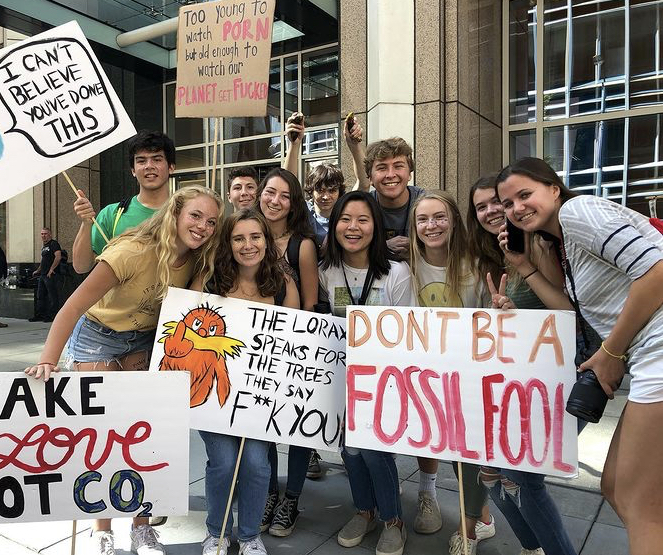President Biden Quickly Takes Action to Help Preserve the Environment
Menlo students attended a climate strike in San Francisco in September 2019 to demand legislative action in reducing climate change. Photo courtesy of Alix Borton.
February 1, 2021
Within the first three days of his presidency, President Joe Biden issued 30 executive orders. A third of these executive orders reversed orders issued by former President Donald Trump, including orders concerning the environment.
In 2017, Trump withdrew the U.S. from the Paris Climate Agreement. 189 countries are formally part of the agreement, which is a non-binding accord among countries to reduce their carbon emissions. According to The New York Times, Trump’s administration rolled back more than 100 environmental rules during his four-year presidency. Some of these rollbacks dealt with air pollution, emissions, drilling, extractions and water pollution.
During the Obama era, various laws that forced companies to limit carbon dioxide emissions were enacted, but many of Trump’s measures weakened these restrictions on companies, such as reducing the usage of coal and the consequent greenhouse gas emissions. In 2019 the Trump administration created a new rule called the Affordable Clean Energy rule. The rule gives states the power to determine the degree to which they want to scale back on emissions; meanwhile, former President Barack Obama’s plan would have set national emission regulations that force reductions in the use of coal for energy, according to The New York Times.
According to his website, Biden created a plan called the “Clean Energy Revolution” to address climate change. The plan’s overarching goal is to ensure that the U.S. achieves a 100% clean energy economy and reaches net-zero emissions by 2050. To do so, Biden developed a $2 trillion economic plan that includes cutting carbon emissions from the electricity sector by 2035. According to Biden’s website, during the first year of his presidency, he aims to convince Congress to enact legislation that establishes an enforcement mechanism with milestone targets, invests in clean energy, encourages climate innovation, promotes research and incentivizes the deployment of clean energy innovations throughout the U.S.
Biden has ambitious plans for his first 100 days in office, including convening a climate world summit to persuade other countries to make national pledges to reduce greenhouse gas emissions and be a leading force in creating enforceable international agreements.
On Jan. 20, Biden signed an executive order to rejoin the Paris Climate Agreement, a process that will take 30 days. In another executive order, he canceled the permit for the construction of the Keystone XL pipeline, which would have transported oil from Canada to the U.S.
Senior Alix Borton, one of the leaders of Menlo’s Climate Coalition, is very hopeful for Biden’s plans and actions thus far to combat climate change. “By centering his plan around jobs and instilling the same rhetoric of relief and economic progress as the New Deal, Biden is helping Americans realize that sustainability doesn’t limit growth,” Borton said. “Any action in politics is a step in the right direction. I think that Biden’s aggressive plans for clean energy will make great progress for our country, if they can get past congressional Republicans.”
Junior Cassidy Hurwitz shares Borton’s optimism about Biden’s environmental plans. “I am not educated enough to speak on it from an economic standpoint, but I definitely think his push towards clean energy is the right move. I feel like his actions will make an impact on the climate because it will be at such a large scale, compared to each of us who can only do so much individually,” Hurwitz said.



